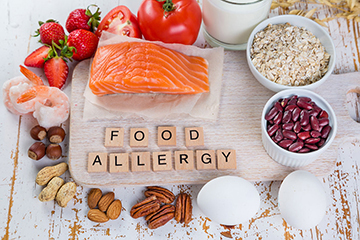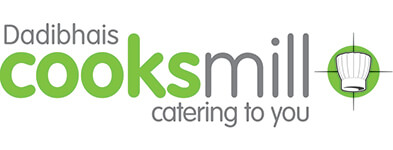Allergen legislation for food businesses in the UK

Anyone involved in the food service industry will have heard of Regulation (EU) No 1169/2011 on the provision of food information to consumers, which came into force on 13th December 2014. Yet even now, almost 5 years later, we still hear about errors or misinformation in relation to the presentation of food allergen information, which can, and does, have tragic consequences.
The food labelling allergens legislation was introduced to help sufferers of the most common food allergies make informed choices about the food they eat, whether purchased in a supermarket and prepared in the home or eaten in cafe, pub or restaurant.
What are the 14 listed allergens under the legislation?
Under the allergen legislation, fourteen allergens need to be declared if they are an ingredient in the food or drink you are serving:

- Celery
- **Cereals containing Gluten (sub-allergens: Wheat, Barley, Rye, Oats, Kamut, Spelt)
- Crustaceans
- Eggs
- Fish
- Lupin
- Milk
- Molluscs
- Mustard
- Nuts (sub-allergens: Almonds, Brazil nuts, Cashew nuts, Hazelnuts, Macadamia nuts, Pecan nuts, Pistachio nuts, Walnuts)
- Peanuts
- Sesame Seeds
- Soya
- Sulphur Dioxide (needs declaring if the product contains levels at or above 10 parts per million)
** For Cereals containing Gluten and Nuts, the sub-allergen (source) of the gluten or nut must be given.
For detailed information on EU allergen legislation, the Food Standards Agency provides technical guidance, which describes responsibilities in relation to the legislation. In addition, the government provides useful information and training, including free online training.
What are the responsibilities of the food business?
- To provide allergen information to the consumer for both pre-packed and non-prepacked food or drink
For the caterer, this generally relates to non-prepacked food. There is a responsibility to provide information about the 14 allergens covered by the legislation, for all food or drink items on offer, including items prepared within the business such as menu items or cocktails. Be aware that some commercial drinks contain allergens, such as sulphites in wine or nuts in some liqueurs.
Under EU legislation food allergens should be clearly declared to anyone in need of allergen information. It is important to have information available about any of the fourteen allergens which appear as an ingredient for each recipe within the business and to communicate to your customer that the information is available, using either a physical notice or one on the menu. For a smaller business, it might be quite easy to refer to product labels to ascertain the allergen content of a dish, but where many different dishes appear on the menu, this can be more complicated and time-consuming.
Customers can often access an allergen portal online for many restaurant chains, meaning the information is readily accessible before visiting the restaurant, although it is always recommended that anyone with a food allergy checks directly with the chef or manager, in case any last-minute changes (due to, for example, product substitution or seasonal menu changes). Other businesses might find that a database, either electronic or hard copy, suits them best. Many catering management software solutions allow for the recording and reporting of allergens by dish, which can make life much easier.
In all cases, it is important to bear in mind that the quality of the information provided to the end consumer is only as good as its source information. Recent research has shown that even almost 5 years after the introduction of the legislation, errors are still being made in the recording and reporting of allergens. The key is to check and then double-check any information you provide.
- To handle and manage food allergens adequately
Robust processes within the business are essential to ensure risk is managed. This includes managing food storage and preparation to ensure cross-contamination or non-intentional presence of allergens is eradicated wherever possible.
At present there is no allergen chopping board legislation, however, colour-coded chopping boards and storage containers can assist in keeping your food preparation areas free from cross-contamination, as can consistent and informative labelling. And of course, thorough cleaning of food preparation areas can ensure any risk of cross contamination minimised.
At the point of contact, it is good business practice to ask if the customer has any allergies. This can help ensure that nothing is overlooked, and the customer can have confidence in the food they are eating.
- To make sure that all members of staff are trained about allergens.
Staff must feel confident that they know how to keep food allergic customers safe, which should include knowing how to handle food allergens in the kitchen. Further information about staff training can be found on the government website and through third-party providers. Websites such as www.allergyuk.org or www.anaphylaxis.org.uk are also useful to increase your knowledge of food allergies.
What can food businesses do to help customers who suffer from allergen problems?
- Ensure management and wider team members are well informed about the legislation so that they understand customer issues and can assist confidently.
- Good communication: speak to your customers about their allergens, speak to your suppliers about their products, speak to your staff to ensure they are confident about handling allergens in customer facing roles.
- Keep a record of issues and problems to help improve internal systems
- Providing alternative menus such as a menu which is specifically gluten-free for customers who may suffer from wheat intolerances or Coeliac disease.
- Providing alternatives such as milk alternatives (soya, almond or oat milk etc) for example in a coffee shop.

One-stop shop for all your catering equipment & supplies
Here at Cooksmill, we know the food service industry has come along way since the allergens legislation was put into force back in 2014, however many businesses still need some support! That’s why we now stock a wide range of products to help you and your team reduce allergen cross-contamination, correctly store food and clearly label your items for your customers.
